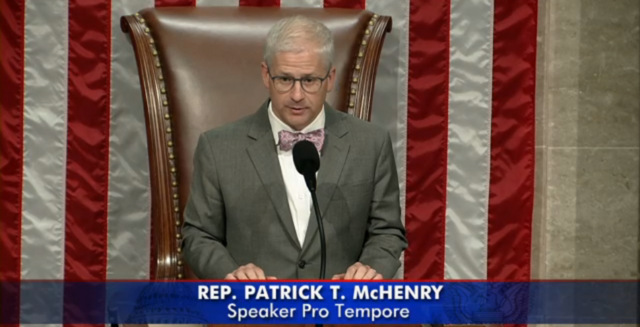In a notable instance of intra-party critique, Speaker Mike Johnson is under fire from fellow Republican, North Carolina Representative Patrick McHenry, over the stalled Ukraine aid bill and looming government shutdown. McHenry, who briefly held the speaker's gavel following Kevin McCarthy's departure, expressed his dissatisfaction on CNN, urging Johnson to expedite the legislative process to avert a crisis.
The contentious bill, aimed at providing a $95 billion aid package, including substantial support for Ukraine, Israel, and Indo-Pacific allies, was left in limbo as Johnson adjourned the House without a vote. This decision has not only strained international relations but also jeopardized domestic operations, with a potential government shutdown on the horizon if a budget isn't passed soon.
Johnson's hesitation stems from concerns over border security funding, a stance that resonates with some Republicans, including former President Donald Trump. However, McHenry and other moderates within the GOP argue that bipartisan cooperation is crucial for governance, emphasizing the need to "bank policy wherever and whenever you can get it."
As the deadline for funding critical departments approaches, Johnson warned of the possible shutdown, attributing the impasse to divisions within the Republican ranks that have ostensibly advantaged the Democrats in negotiations. This internal discord underscores the challenges Johnson faces in reconciling the diverse factions of his party, from the hard-line Freedom Caucus to more centrist members willing to collaborate across the aisle.
McHenry's public rebuke of Johnson's leadership signals a growing impatience within the GOP for decisive action. His call for Johnson to "be better" reflects a broader desire among Republicans to move beyond internal disputes and focus on legislative achievements. This sentiment is echoed by C. Stewart Verdery Jr., a former Homeland Security official, who warned that Republicans might regret missing the opportunity for comprehensive border policy reform presented by the Senate bill.
As the clock ticks towards the government shutdown deadline, the political deadlock in Congress highlights the intricate dance of negotiation and compromise essential to U.S. governance. With McHenry stepping down at the end of his term and Johnson grappling with the pressures of leadership, the GOP finds itself at a crossroads, facing the dual challenge of uniting its ranks and delivering on its legislative agenda. The outcome of this standoff could have far-reaching implications, not just for the Republican Party, but for the nation as a whole.






